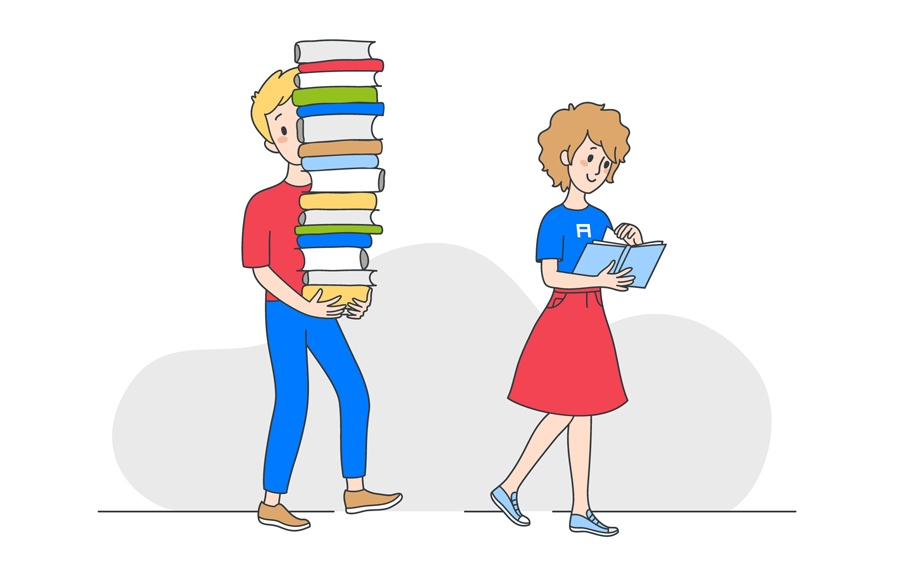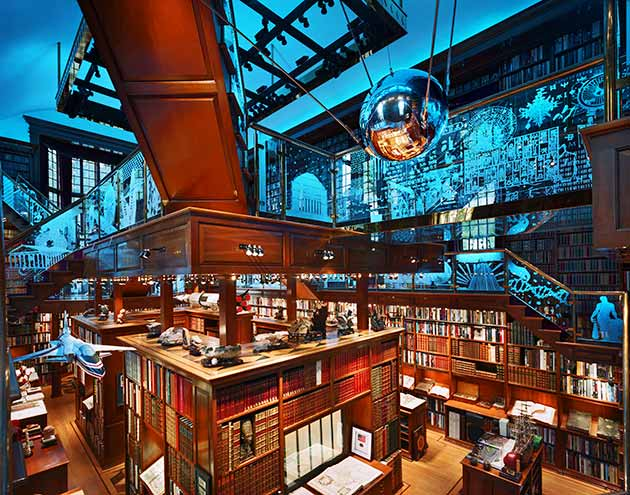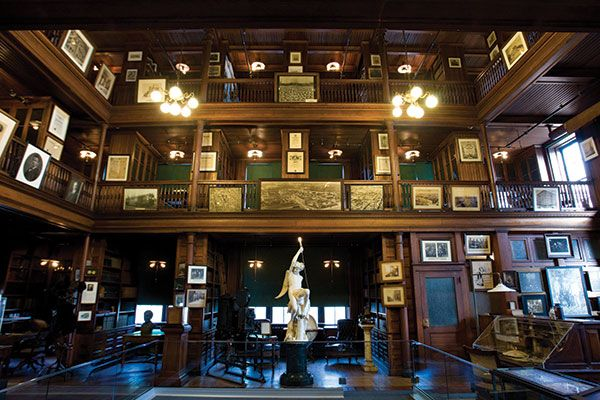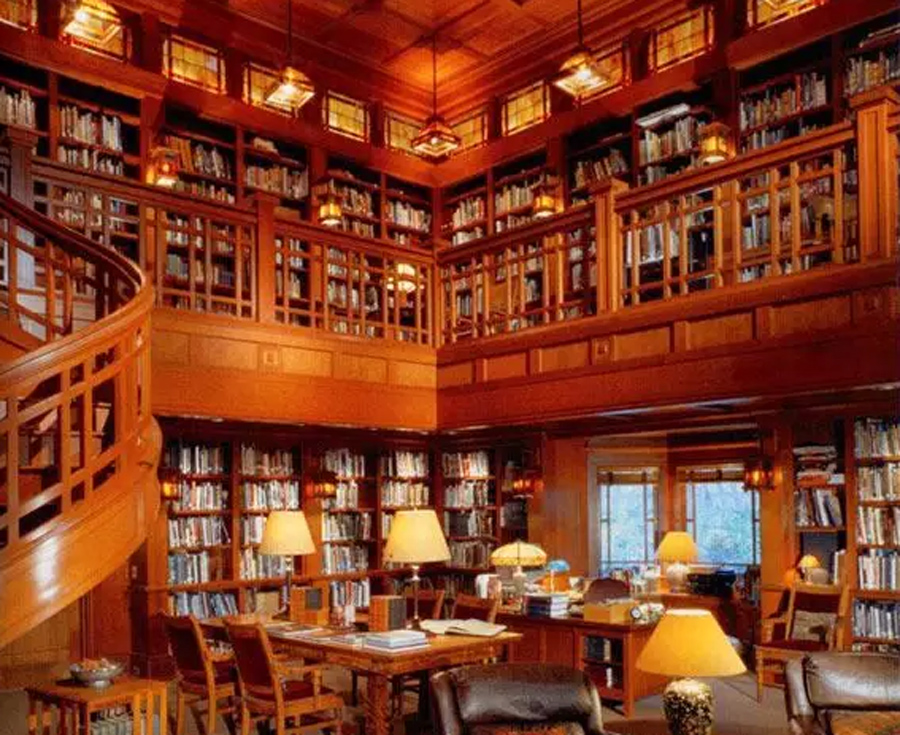Your reading style says a lot about your intelligence - and this is why
- Transfer

Let's tell why the smartest people in the world have mountains of books they don’t read.
If you like to read as much as I do, then going to the book for you is like going to a candy store for a child.
On the shelves lined the treasures of human wisdom, revelation, which each of the authors polished over the years. All this here, right at your fingertips, is concentrated in a format with which you want to curl and under the blanket.
Naturally, you pull out a credit card or click the "Buy" button.
And books are piling up. You have on the shelves. In the bedroom. In car. Maybe even in the bathroom.
The most selfless bibliophiles are looking for a place where previously no one could deliver books:

Source: http://bit.ly/2JRrqbk
And as the books pile up, so does your greed. No, not the desire to read all the books that you buy. Thirst for not reading those books that you started.
If the next sentence is about you, then I have to rejoice you.
“Even if you don’t have time to read them all, overflowing bookshelves or a reader is good for you.”
- Jessica Stillman
In this article I will explain why those who really take the time to read and learn to learn, unread books scattered throughout the house, just testify to high intelligence, and not his absence.
Transferred to Alconost
Not only that the heaps of unfilled books scattered everywhere are the handwriting of the clever man; such a person will make you an excellent company. I finally reconciled with my own greed when I became acquainted in detail with the reading habits of brilliant entrepreneurs and in my own way interrogated my most successful friends. Most of them read only 20-40 percent of those books that they buy. Many of them can read 10 books at a time. In fact, one of the most eager readers in the technical beau monde, a billionaire entrepreneur who made himself, estimates that ...
“Maybe I'm starting to read half of those books that I buy, I read, perhaps, a third of them. As a result, I read 1-2 books a week. ”
- Patrick Collison
What is going on?
Studying the reading habits of those around, together with the tremendous changes in our society, where knowledge predominates , I became convinced that our new times dictate new ways of searching, filtering, consuming and applying knowledge - only in this way can life be changed for the better.
The information explosion that takes place in various environments and formats, new research tools that help find the best information, and applications that help it to assimilate, not only encourage us to read more. They encourage us to read in new ways.
A significant part of my reading life is to go deep into an artist in the old manner, but when I read to learn something, not to relax, I use a lot of tricks and strategies, choosing which books to buy and how to read them.
The following are the most intelligent life hacking for reading non-fiction, which I picked up from world-class entrepreneurs.

Life hacking first: We consider books as an experiment
My friend Emerson Spartz , a successful serial entrepreneur and investor who has read thousands of books, convincingly demonstrates that buying a book is an experiment. Costs are small: you have to give 15 dollars and spend a little time. However, if you're lucky, the book can change your life. The rates are very good!
It is known that the more “smart” experiments you perform, the higher your chances of finding a breakthrough experiment that will change everything . The most renowned scientists and the most successful companies are usually the ones that are most experimenting .
My experience suggests that you need to study, buy and research 10 books before you find one that, in my opinion, contains breakthrough knowledge .
A good experimenter is inherent willingness to go for some losses. Thus: whenever you buy a book, but it turns out to be nonsense - you are still a step closer to the book that will change your life.
Life hacking second: Practice fractal reading
We, as a knowledge society, have reached a turning point. Metadata generated by books (i.e., author interviews, author presentations, book annotations, reviews, quotes, first and last chapters, etc.) are often no less valuable than the book itself.
Why?
- All this for free. This information allows you to try many more books before you buy. Consequently, in every “experiment” with the purchase of a book, our chances of success increase.
- This is multimedia. All this information is available in the form of texts, audio and video, so that it fits better in your everyday life (for example, you can read on trips "back and forth" or during routine work).
- In this case, we have a high signal-to-noise ratio. In an abbreviated format, all the water is removed, the main ideas are immediately served.
As well as a book is the quintessence of the best ideas of the author, metadata is the quintessence of the book.
Therefore, I call this approach to reading "fractal"; after all, fractals are figures whose structure detects identical patterns regardless of scale.

We have reached the moment when, perhaps, it will be more useful and more convenient to read non-fiction in the “fractal” mode, and not the whole book from cover to cover. For example, I can estimate that I spend 50% of purposeful study time on fractal reading, and not on deep sequential reading. So it’s easier for me to choose books that I’m going to dive into, and also to recognize the most important and essential sections of the book so that I can go directly to them. In most cases, the fractal reading of five books will be more valuable and more interesting for me than studying one book from cover to cover.
Here is how it is done:
- We read 2-3 book annotations (we search in Google). For almost any book, you can find a few annotations, which often contain the most sensible information from the book (20% of the ideas containing 80% of its value). Let me explain: here I mean only non-fiction books; this rule is naturally not applicable to fiction.
- We listen to the author's interview (podcasts, Google). Interviews are fascinating, and the facilitator takes over your work by asking the author the most significant and intriguing questions that have been formulated following the reading of the book.
- We look at the presentation of the author (TED, Google or university lecture). When the author is forced to put a 200-page book in a 20-minute lecture, he shares his most important ideas, combining them into an optimal plot.
- We read the most useful 1-star, 2-star, 3-star, 4-star and 5-star reviews (Amazon). Amazon will help everyone quickly sort out the most thoughtful reviews - ranging from reviews of readers who have fallen in love with her, to reviews of those who hated her.
- We read the first and last chapters of the book. The first and last chapters of the book often contain the most valuable information (of course, this principle does not work if you want to plunge into the novel). In addition, the first and last paragraphs of each chapter contain her most valuable ideas. Given that Google Books has free eBook Probes, and Amazon has a Look Inside feature, you can often get the first and last chapter of the book for free.
Life hacking third: Unread books should remind us how little we really know
Intellectual humility is so valuable not only because it is a virtue. It is valuable in that it allows us to more conceptually conceptualize ourselves and our place in the world, and this helps us to live more efficiently and harmoniously. For example, modesty helps us make better decisions and inspires us to learn and learn .
This is how I see it: in the world there lived billions of people, who for thousands of years gained knowledge and documented it. The knowledge of one person in comparison with the collective knowledge of all mankind is just a drop in the ocean. And this sea is expanding at an inscrutable rate. Most of the scientists who ever lived in the world are our contemporaries !
Moreover, if we talk about all the knowledge that humanity is able to get, and about what we have already discovered, the first is like a whole universe, and the second is a grain of sand. So here are three levels for nurturing our humility:
- Knowledge of the individual
- Modern knowledge of mankind
- All potential knowledge
However, at the level of everyday tangible experience, it seems that we know much more than we actually do. When all is well, many people think that they have comprehended the notorious "meaning of life." As if we are at the end of a cycle, and not at the beginning. Simply, we are constantly reminded of the already known and rarely (if at all reminded) of the unknown.
Naturally, conceptually, we can realize that we know far from everything, but we do not physically feel this. I recently remembered this well when I spent two hours on a tour of two of the six libraries of Princeton University. I happened to bypass the space of 10 football fields, crowded with books and scientific magazines. On the one hand, I was inspired by examining all this and realizing that all this can be studied. On the other - experienced extreme humility. The libraries helped me realize how little I currently know, and understand that even if I spent my whole life just reading, I would have learned a tiny bit of what was collected in them.
Collecting anti-library, that is, accumulating unread books at home, one can experience similar feelings. Nassim Taleb, a successful investor and best-selling author, brilliantly describes the value of an anti-library in his book The Black Swan :
“The personal library is not an appendage to the image, but a working tool. Read books are less important than unread books. The library should contain as much of the unknown as it allows you to accommodate your finances, mortgage loans and the current difficult situation in the real estate market. Over the years, your knowledge and your library will grow, and the thickening rows of unread books will start to look at you threateningly. In fact, the broader your outlook, the more shelves you have with unread books. Let's call this collection of unread books an anti-library. ”
Not only Taleb holds this view. Italian writer and philosopher Umberto Eco collected more than 30,000 books. Thomas Jefferson collected 6,000 books, so at that time his library was the largest in the country. Jay Walker, the founder of Priceline.com, gathered such a huge library that he later built himself a house around it . Thomas Edison installed his desktop in the center of his own three-story library. The house of Bill Gates has many rooms, but his favorite is his own huge library of 2100 square feet.

Private Library of Jay Walker , Founder of Priceline.com

Thomas Edison

Library. Bill Gates Personal Library
Life hacking fourth: throw good books, read great
In one excellent podcast from the Knowledge Project, Patrick Collison, founder of the Stripe project, a billionaire who made himself, puts forward the following thesis:
“At any given time you must read the best [for you] book in the world as you only know. However, as soon as you find another book that seems more interesting or more important, the current reference book should be discarded without hesitation ... any other algorithm will lead to the fact that over time your reading matter will get worse and worse. "
In other words, remember what you were taught - and do exactly the opposite. Instead of trying to “finish off” any started book with all your might, allow yourself to simply postpone this book - but only if you find it more valuable. Life is too short, and there are just too many good books in the world. On the other hand, be careful and try not to go too far in the opposite direction - that is, do not reject excellent books just because you got some kind of novelty with a catchy name.
How to understand if you started randomly jumping from book to book? This is where fractal reading comes in handy. If the meta information on the book did not attract your attention, it is unlikely that the whole book will be enough for this.
Layfkhak the fifth: With the help of books you read, free up space in your head for a clash of great ideas
It is known that targeted advertising is effective. The addressee perceives it both consciously and subconsciously. Similarly, there are those books that we competently have in the existing context.
My mentor, business partner and friend Eben Pagan compares the bookshelf with a playlist of eternal intellectual masterpieces:
“The most important book on your shelf is one you haven’t read yet. If you have a promising book, then perhaps the time to read it is not yet. Maybe you will mature to it in a year, or maybe in ten years. However, if you notice a book at the right moment, you will become interested in it and take it off the shelf. ”
Patrick Collison argues in the same way:
“Another skill that I consider very valuable is simply to put the book aside. When someone recommends a book to me, I can often take a copy of myself ... and put it aside. So, the books are in my kitchen. Lie in the bedroom. They are just scattered everywhere.
Moreover, the situation is surprisingly widespread when someone else will recommend a book to you, or some of its aspects, and it is still at hand. In sight. And you will think: “Oh, in fact, you need to get acquainted with this thing.”
Or learn about the importance of the book in some other way. Read the article. You will begin to realize its zest, or the question posed in it, or something else.
Thus, one of the reasons why I continue to appreciate paper books is that the book creates for you a peculiar space of ideas in which fruitful collisions occur between such ideas more often. ”
Life hacking sixth: read books like magazines
Journal reading is a powerful metaphor. Taking a magazine in our hands, we do not feel embarrassed if we miss some pages in it, or scroll diagonally in 5 minutes. On the contrary, we will look through the magazine in order to find the most interesting and important articles, and then, having found them, we revere them thoughtfully and slowly. This approach is very strong on several levels:
- It helps to find the most important information that should be studied in depth.
- It helps to slow down, so that we can get the most out of the information that we have decided to study in depth.
- Simplifies reading, making it easier for us to stay consistent.
Let's admit: now it is not so easy to concentrate for a long time, as before. Yes, it would be great to sit and read for hours, without being distracted by anything, but if this is not done properly, then the benefits are zero.
A zealous reader and the famous technology investor and entrepreneur Nawal Ravikant for the first time applied a reading system that helps to usefully carry out even shorter periods of sharp attention.
Ravikant noted that among the most valuable books there are many old sources that form the basis for other books. The value of these books he describes in one of the series of the podcast by Tim Ferriss :
“The older the problem, the older the solution. If you talk about an old topic, for example, how to maintain physical health, remain calm and peaceful, what value systems are good, how to arrange a family ... for such problems, old solutions are perhaps better than new ones, since they have stood the test of time. Any book that existed for 2000 years, "filtered" by many people.
However, Ravikant notes an important challenge associated with reading books of this kind:
“... but I knew that this is a very difficult problem, because my brain is used to perceiving Facebook, Twitter and other sources, where information is given by a teaspoon. Therefore, I applied the described tactics when I began to perceive the books as disposable blog articles or miniature tweets, or Facebook posts. I do not feel any obligation to read the book. Now that someone is pointing me a book, I buy it. At any time I read from 10 to 20 books. I scroll through them as soon as the book starts to bore - I miss the uninteresting. Sometimes I start reading a book from the middle, because a paragraph attracted my attention, and from there I continue. I don’t feel the need to read. If at some point it seems to me that the book is boring because of obviously erroneous fragments (and I can no longer trust the rest of the information contained in it), I just delete them and no longer remember them. Now I treat books like others — any other light information that can be found on the Internet. Quite suddenly, the books returned to my circle of reading. ”
Finally, the point is not how many books you read to the end
It is difficult to distinguish just a book Plushkin and an intelligent reader, just by visiting them at home. And one and the other will have books lying around. However, this resemblance is superficial. In fact, there are three key differences between a sweet and a smart reader.
- Clever readers have established a well-established ritual of learning. I recommend to follow the 5-hour rule: spend about an hour reading per reading, following the example of many leading entrepreneurs and leaders. Today I devote to systematic education 4-5 hours a day, at the same time managing to lead my company and raise two children.
- A smart reader learns to learn. In other words, he is learning how to spend the maximum time spent reading. I wrote a free newsletter course that will help you master mental models - and this is one of the most important skills that helps you learn faster and better. This course covers the models used by the billionaire investors that they use when making decisions in business and investing. This is an arsenal that you can begin to apply in life and in business now. You will also learn how to naturally introduce these models in your daily life.
- Smart readers continue to act until they achieve the desired result. The value of theoretical knowledge - in the ability to apply them in practice.
If we consistently adhere to these three principles, then the time will come to say goodbye to the feeling of guilt. You are absolutely not obliged to read all the books that you have on the shelf. And taking a book from the shelf is not required to read it to the end.
Plyushkin is proud of how many books he has, and an intelligent reader, about how much he has been able to extract from his books.
About the translator
. The article is translated in Alconost.
Alconost is engaged in the localization of games , applications and websites in 70 languages. Language translators, linguistic testing, cloud platform with API, continuous localization, 24/7 project managers, any string resource formats.
We also make promotional and educational videos.- for sites selling, image, advertising, training, teasers, expliners, trailers for Google Play and the App Store.
Read more
